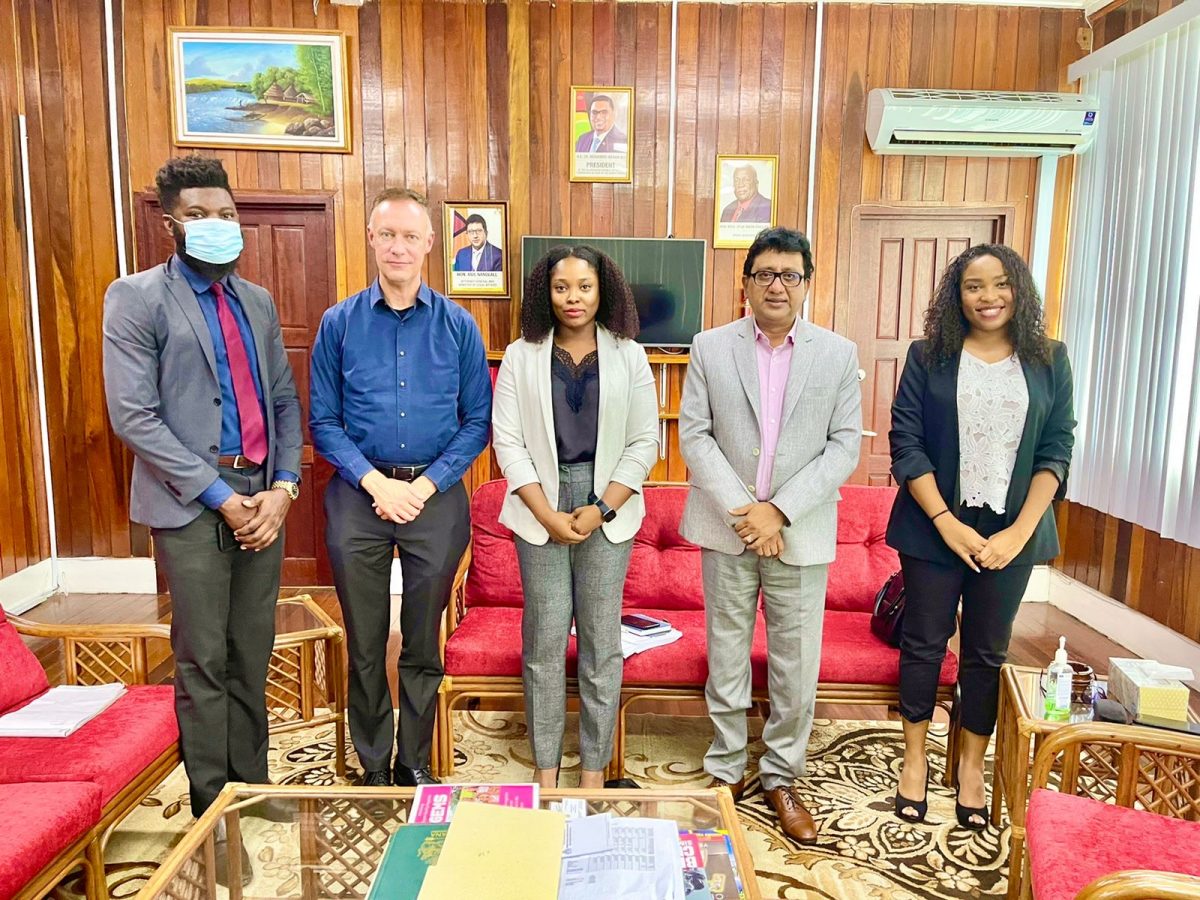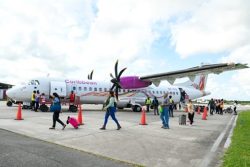The United Nations Office on Drugs and Crime (UNODC) is to make recommendations to Guyana on strengthening its anti-corruption weaponry.
This development follows the completion of a three-day anti-corruption workshop in Guyana this week.
A release yesterday from the Attorney General’s Chambers said that UNODC officers paid a courtesy call on Attorney General Anil Nandlall to update him on the recently completed Anti-Corruption Workshop. The workshop was facilitated by the Ministry of Parliamentary Affairs and Governance, with support from the UNODC and was aimed at building institutional capacity for reporting and fighting corruption.
The release said that the officers informed Nandlall, also Minister of Legal Affairs, that Guyana is currently under review as it relates to the UN Convention Against Corruption and the UNODC came to support that process. The workshop therefore focused on the checklist process which involves Guyana assessing itself against the Convention Against Corruption.
“After the checklist is completed there is then a desk-based review where recommendations would be made highlighting how Guyana can strengthen its laws, policies and institutions dealing with anti-corruption. This will enable Guyana to fully implement the Convention”, the release said.
The release said that the Attorney General reaffirmed that Guyana is committed to combatting corruption in all its forms and this is “evidenced by the fact that the country has signed on to all major international anti-corruption agreements in the hemisphere. He reminded that the Government has taken a strong stance against corruption and has instituted several legal proceedings tackling the corruption which permeated and flowed from the previous administration both in civil as well as commercial Courts”.
The release said that Nandlall expressed a preference for a common, specific legislation in the Caribbean dealing with corruption. He further said that as Guyana is now an oil producing nation, this new sector brings with it new challenges, risks and responsibilities. Therefore, he said that the Government has to take the “requisite steps” to build the regulatory framework that can address the issue of corruption in the various sectors.
On the issue of technical assistance, the release said that UNODC signalled that they provide assistance to countries in the preparation of legislation and review of draft laws and legislation. The AG informed the UNODC officers that Impact Justice Caribbean has prepared a model Anti-Corruption Bill for the region. The UNODC has signalled a willingness to review the said Bill.
The officers who visited Nandlall were Bo Shakira Harris, Associate Programme Management Officer and Jason Reichelt, Crime and Prevention Office at UNODC. Also present at the meeting were Joanna Bond, Deputy Chief Parliamentary Counsel and Chevy Devonish, State Counsel of the Attorney General Chambers.
Prosecution
During the 2015-2020 APNU+AFC administration, the UNODC had expressed interest in a number of areas including assistance with prosecution of corruption cases but it appeared that that project did not take off.
In September 2018, almost a year after former UK Prosecutor David Robinson had arrived in Guyana to spearhead an anti-corruption project, there was no available information on what he was doing or had done to that point.
Then Attorney General Basil Williams SC, who met Robinson shortly after his arrival in 2017 had told Stabroek News that he had no knowledge about his work.
“You will have to ask him,” Williams said when asked about Robinson’s work during a press conference.
Soon after his arrival, the UNODC advisor had handed a draft anti-corruption work plan to government in relation to the GUY24 project, which was aimed at supporting the prevention, investigation and prosecution of corruption.
Williams, when asked whether he has been briefed on the GUY24 project, said he had met with Robinson initially. “..You’re asking a good question. We have our programme, we have been doing our anti-corruption sensitization throughout Guyana in the different regions. I can’t tell you about how Mr. Robinson’s programme is going… how it is being executed and such,” he said.
“…Don’t forget, he is with an independent body,” he added, when pressed on the issue.
The then Ministry of Legal Affairs had announced Robinson’s presence in Guyana in a statement on September 10, 2017 but did not mention that his arrival here was as a result of a proposal made in 2015 when the APNU+AFC administration took office.
In its statement, the ministry had described Robinson as a British advisor for UNODC. According to the statement, Robinson’s visit came at a time when he was preparing to spearhead the GUY24 project. At a meeting, the statement said, Robinson informed Williams that he had drafted an anti-corruption work plan, which set out his planned activities to strengthen Guyana’s anti-corruption regime. This plan was to be reviewed by the government, the statement said, while adding that to execute the work plan Robinson would be collaborating with all anti-corruption agencies and stakeholders, including the Special Organised Crime Unit, the State Assets Recovery Agency and the Financial Intelligence Unit.
In November of that year Williams had disclosed that the draft work plan was shared with government and stakeholders. He said that it would be looked at and that government had not “made that determination [to accept] yet.”
The AG clarified that Robinson was here in an advisory capacity and would not be actively involved in the prosecution of corruption matters.
He had said too that the advisor was here within the UNODC’s remit to “look at corruption and would probably assist our approach. You know we have an anti-corruption drive.” He noted that it was the United Nations that has appointed him and as a result all information ought to be had from him.
UNODC Regional representative Amado Philip de Andres had told this newspaper that the body had delivered on its promise to appoint a prosecutor to deal with corruption matters in Guyana.
de Andres had said from his office in Panama that Robinson would be supporting the Guyanese authorities to “strengthen national capacities to fight …corruption and money laundering.”
Another UNODC official, Augusto Lavieri, had told Stabroek that Robinson was working with national counterparts in the implementation of a number of priority activities that need to be carried out before the end of that year.
There has been no further information about this project.






